These two L.A. chefs aren’t staying quiet. Their meals are fueling a revolution against racism
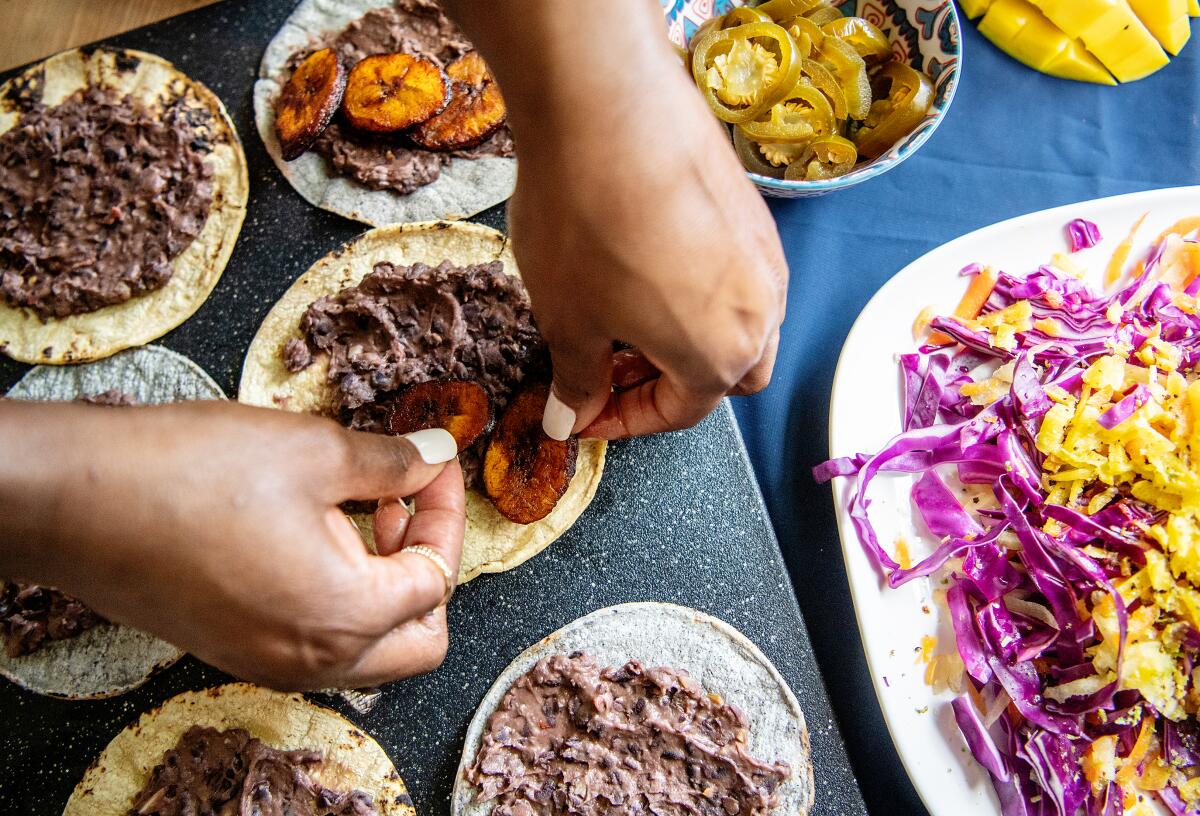
- Share via
On a recent Sunday afternoon, Rogelio “Rogie” Hernandez, wearing a canvas apron, disposable gloves, and a coiled bandana tied around his brow, set up a small table at the edge of Grand Park in downtown L.A., where he passed out small plastic containers filled with home-cooked beans and rice, fingerling potatoes, green salsa and fresh bolillos to a small group of protesters standing vigil at City Hall.
A crowd gathered around Hernandez’s table, many flashing grateful thumbs-ups, others making a show of scraping their bowls clean.
Hernandez and his home-cooked meals have become a fixture of Grand Park since the weekend of May 30, when protests over the death of George Floyd began to fuel a major moment of racial reckoning in the U.S. and around the globe. Feeding people is his way of supporting the Black Lives Matter movement, he said.
The 28-year-old Boyle Heights native, currently a cook at the Highland Park location of the upscale grocer and cafe Cookbook, estimates he’s served more than 500 meals in downtown L.A. in recent weeks.
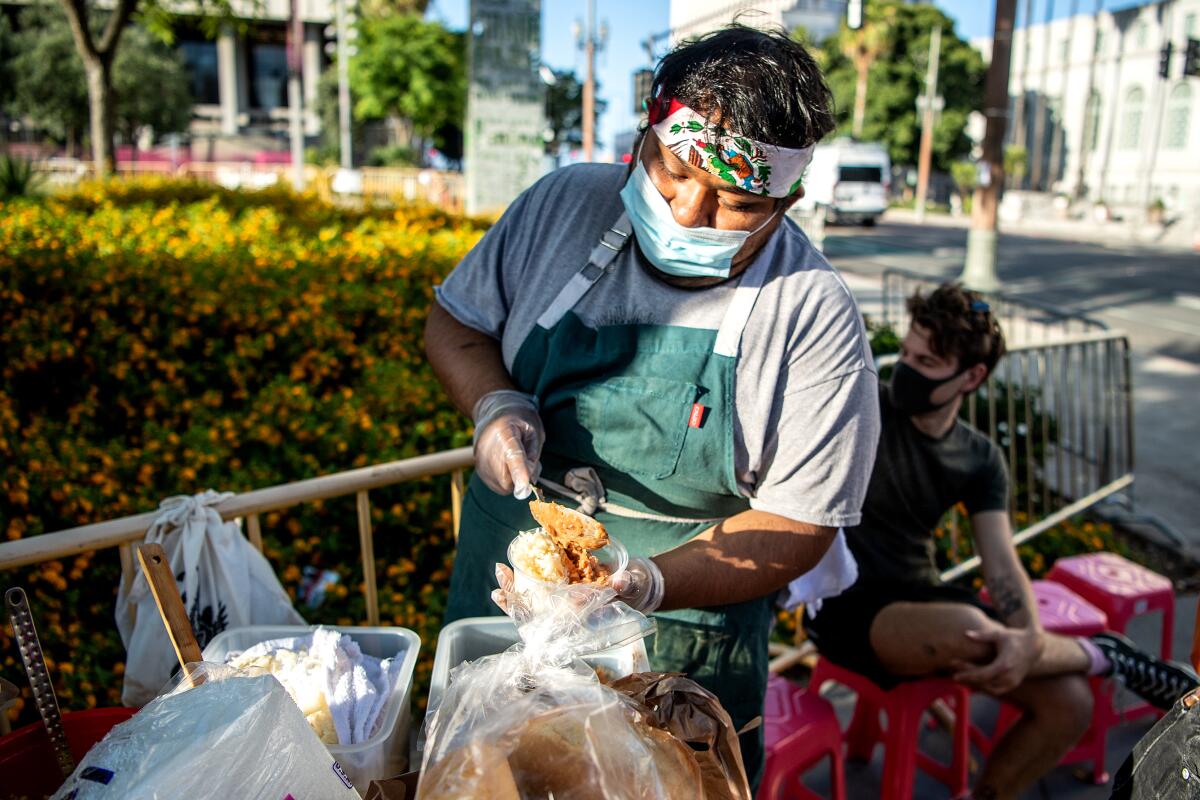
“This is a moment that a lot of people have been dreaming about their entire lives. I don’t think so many Black people and brown people have ever felt closer to being liberated than right now,” Hernandez said. “My goal is to keep people fed so that we can keep this movement going.”
This is a moment that a lot of people have been dreaming about their entire lives. I don’t think so many Black people and brown people have ever felt closer to being liberated than right now.
— Rogelio Hernandez
In another part of town, on that same final weekend in May, activist and health and wellness educator Danielle Elizabeth Stevens was launching #WeStillGottaEat, an initiative to deliver free meals to Black residents in L.A. County, out of her home kitchen in Southwest L.A.
For these two chefs, cooking and feeding others has become a simple yet profound way to fight racism, one nourishing, home-cooked meal at a time.
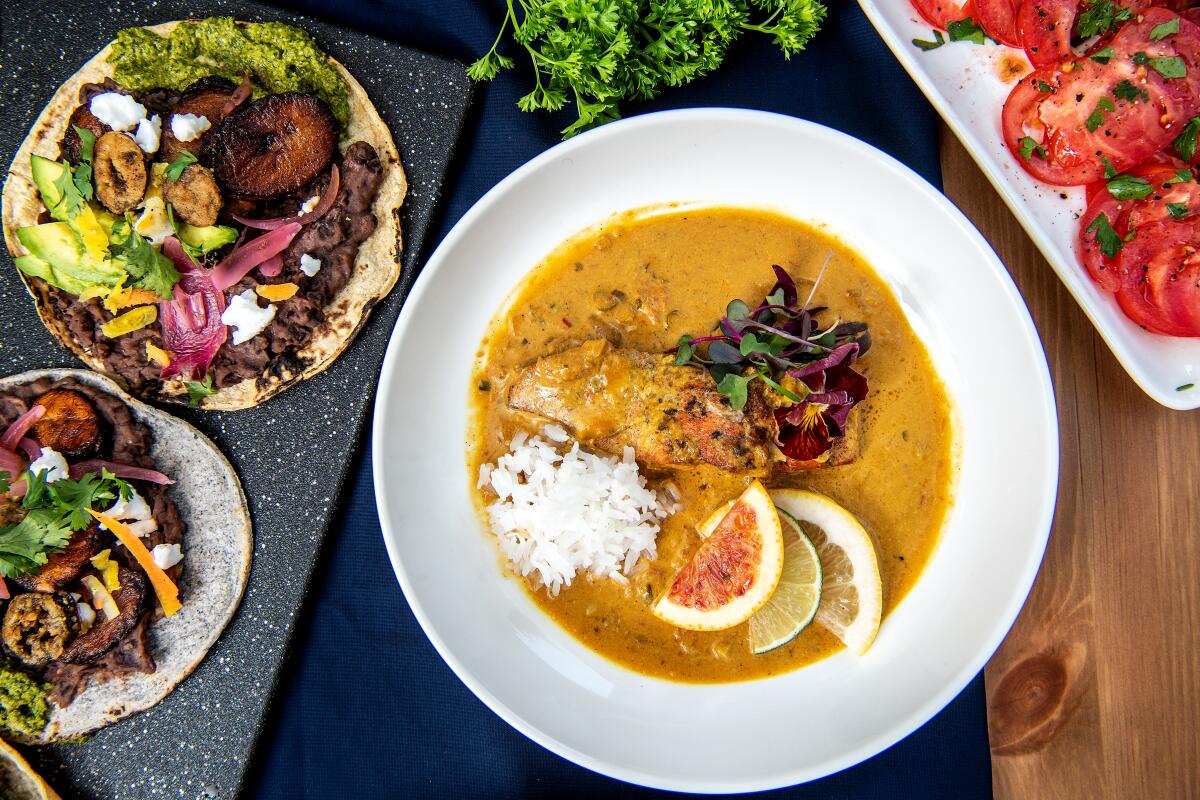
Stevens hopes to target the systemic inequalities that have blighted historically Black neighborhoods in L.A., including food insecurity, hunger and lack of access to fresh, affordable produce.
She also aims to feed Black people who may be feeling depressed, lonely or exhausted by the dual crises of COVID-19 and racial inequality.
With her partner, Mel Aliya, Stevens has cooked dishes such as Berbere-spiced plantains and chile-lime black bean tacos; Thai yellow salmon curry with blood orange and yuzu; and a jerk chicken plate with garlicky black beans, quinoa and vegetables.
I’m doing this work because I think it’s a revolutionary practice to choose to care for Black people, a community that has been so often neglected and exploited.
— Danielle Elizabeth Stevens
The #WeStillGottaEat initiative is deeply personal, Stevens said.
“I’ve been inspired to do this by my grandmother, who was born in North Carolina into forced sharecropping. When I ask her what foods she grew up eating, she tells me she ate whatever the white man gave her.”
That amounted to a diet of table scraps and offal, Stevens said.
“To me, that illustrates how food and accessibility are intentional things. My grandmother never had access to the food systems within her own community, and that was by design. She never had any say on what she was able to eat.”
Stevens is funding #WeStillGottaEat through a Patreon page and through solicitations on her Instagram; a small team of volunteers will deliver a total of around 1,000 meals this month to Black residents around Los Angeles County, who can request a meal using #WeStillGottaEat’s online Google form. She plans to move into a commercial kitchen soon to grow the program.
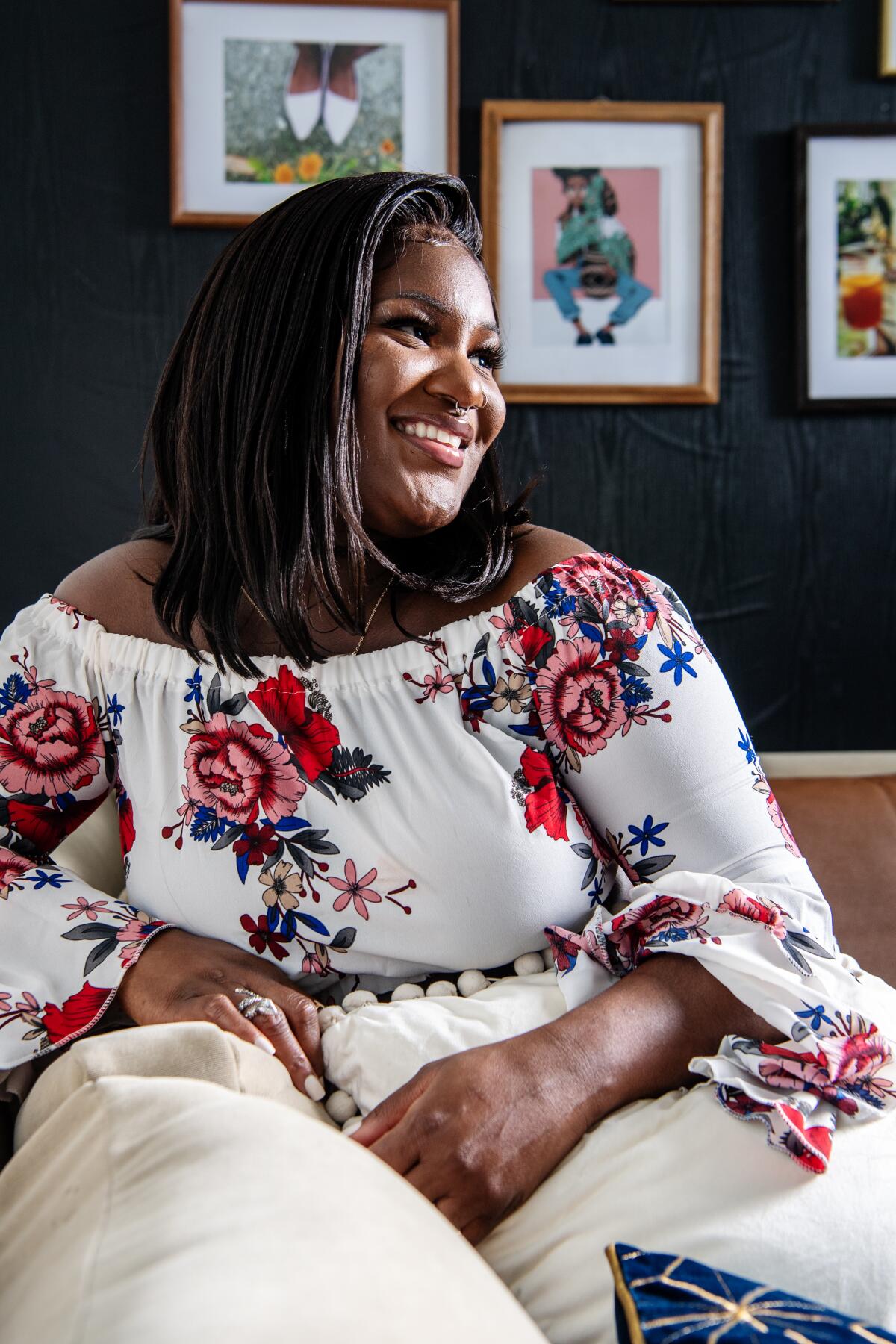
Stevens, who studied sociology at UC Santa Barbara and previously worked as a community health activist, is optimistic that we are on the cusp of social change.
“But it will take more people to align with the Black Lives Matter and food justice movement,” she said. “It will take some discomfort.”
Hernandez, too, has fed hundreds of people this month, an impressive feat for a young chef with no deep pockets, no car and only a tiny, ill-equipped home kitchen. He borrows friends’ kitchens to cook, cobbles together donations and organizes “guerrilla-style” cooking sessions around the surplus produce donated by his employer and friends.
He started one day by making more than 100 sandwiches; in recent weeks, he has started to add more “personal” Mexican and Guatemalan dishes to his repertoire.
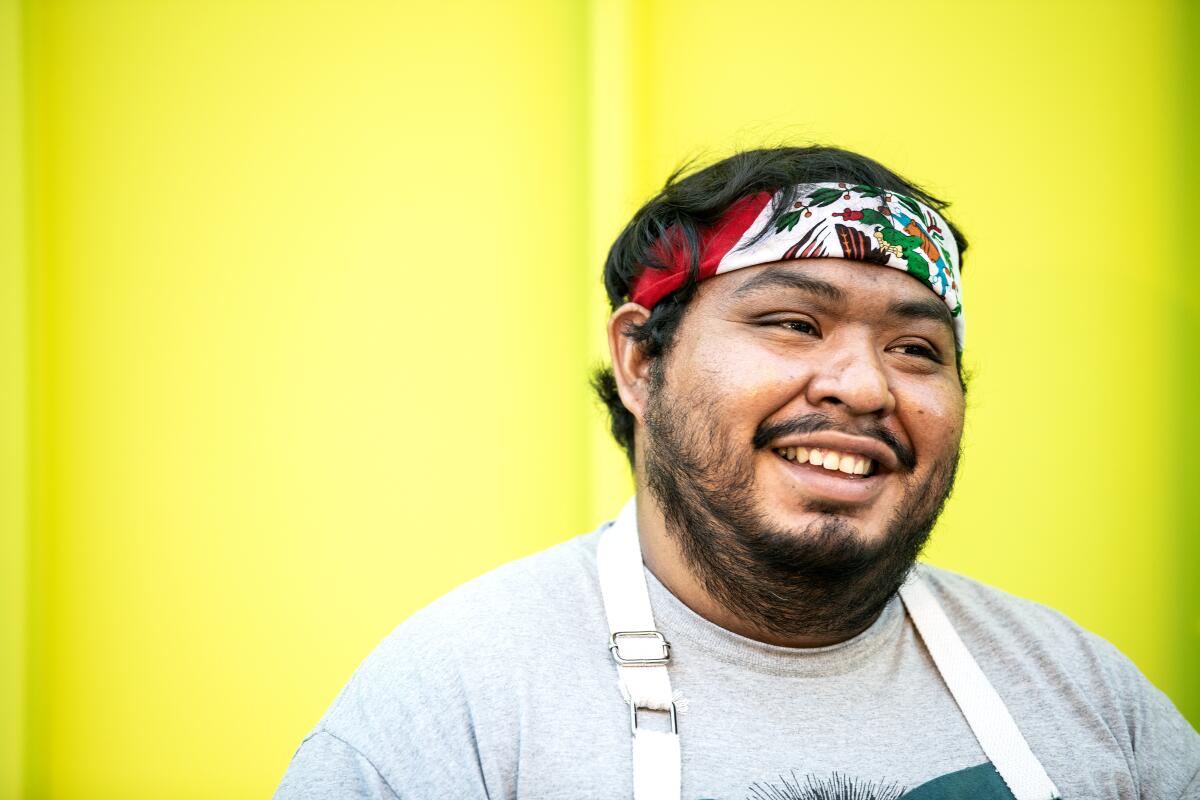
He wonders why more L.A. chefs aren’t tapping into their well of industry contacts and resources to feed protesters or otherwise supporting the Black Lives Matter movement.
“I’ve noticed that a lot of chefs are staying quiet right now. It’s a shame because a lot of these chefs have big platforms,” Hernandez said. “The least thing you can do is put a fundraising link on your social media pages.”
Stevens echoes the sentiment. She notes that her work connects her to the long, complicated and painful history of Black women’s labor in America.
“Historically, Black women have been caretakers,” she said. “People aren’t doing the same for us as Black women.”
“I just really hope that people understand that this moment can be a true shift into engendering a world where Black people are loved, where Black people are humanized and cared for the way that we so richly deserve.”
It’s now time for all Americans to “show up” for Black people, she said.
“I’ve seen people post the black square and say ‘Black Lives Matter’ on social media,” she said. “And then the next day it’s business as usual.”
More to Read
Eat your way across L.A.
Get our weekly Tasting Notes newsletter for reviews, news and more.
You may occasionally receive promotional content from the Los Angeles Times.










